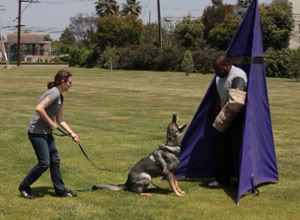 Wait vs stay
#297529 - 09/23/2010 09:01 PM Wait vs stay
#297529 - 09/23/2010 09:01 PM |
Webboard User

 
Reg: 07-27-2010
Posts: 551
Loc:
 Offline Offline |
|
I was wondering a few things about this... I have heard that it is better to teach wait and stay as two different commands, wait (stay there till I call you or tell you to move) and Stay ( Don't go anywhere no matter what). This is what I have been teaching Zuki but am not sure if this is best and why. Another question-at what point in wait or stay do you say "yes"? If it is the release than with Stay I can see coming back to the dog and "yes" treat. This right? What about wait?
Zuki will wait or stay 80% of the time in a down or sit. How can I work on Standing or is that unrealistic? How can I keep her from coming to me when I ask for a different position from a distance?
I don't want to train these wrong since I know how hard it is to retrain!  Better to do it right from the start.
|
 Top Top
|
 Re: Wait vs stay
[Re: Elizabeth Anderson ]
#297531 - 09/23/2010 09:05 PM Re: Wait vs stay
[Re: Elizabeth Anderson ]
#297531 - 09/23/2010 09:05 PM |
Webboard User

 
Reg: 07-24-2010
Posts: 421
Loc:
 Offline Offline |
|
If you want her to stay in a standing position, making a "Stand" command is handy from what I have read.
|
 Top Top
|
 Re: Wait vs stay
[Re: Elizabeth Anderson ]
#297532 - 09/23/2010 09:08 PM Re: Wait vs stay
[Re: Elizabeth Anderson ]
#297532 - 09/23/2010 09:08 PM |
Webboard User
  
Reg: 01-15-2009
Posts: 5090
Loc: Lanexa Virginia
 Offline Offline |
|
Elizabeth, I don't know if this will answer your question or not...
I trained Falcon to "WAIT" at doors, stairs, etc... which simply meant to not go farther until released. This has prooved VERY helpful in that it has translated to - if we are outside heading toward our neighbor's house and he is on the path in front of me but going faster than I want - a "WAIT" will stop him till I'm closer... hadn't planned on that but love it.
We also trained that any command given - ie: sit, down, place, etc... means he complies until released. We never trained "stay" and I don't regret it.
|
 Top Top
|
 Re: Wait vs stay
[Re: Barbara Schuler ]
#297553 - 09/23/2010 09:43 PM Re: Wait vs stay
[Re: Barbara Schuler ]
#297553 - 09/23/2010 09:43 PM |
Webboard User

 
Reg: 07-27-2010
Posts: 551
Loc:
 Offline Offline |
|
I had taught "stand" with the word "up" and she never really got it. I than changed the word to "stand" (thanks to all the movies)and we are working on it (she did really good tonight). She has a very good "wait". That is one of her best. If I am tying her out or at the door or just about anything wait is what I use. However I do use a sit or down before normally. Not sure if this is bad. The only reason I could come up with for "stay" being nice is that the dog doesn't "think" he heard you call and come running. I DO have this at times when I do a wait in distance with Zuki. I have never had that problem when use stay since I started using them as separate commands. When teaching the dog not to move when in sit, down, ect just increase the time till you mark?
|
 Top Top
|
 Re: Wait vs stay
[Re: Elizabeth Anderson ]
#297554 - 09/23/2010 09:46 PM Re: Wait vs stay
[Re: Elizabeth Anderson ]
#297554 - 09/23/2010 09:46 PM |
Webboard User
  
Reg: 01-15-2009
Posts: 5090
Loc: Lanexa Virginia
 Offline Offline |
|
When teaching the dog not to move when in sit, down, ect just increase the time till you mark?
Yep.
I would wait a bit longer before "yes!" and a reward. Then I began adding "goooooood, goooooood". If he moved, a "NOPE!" and start again.
|
 Top Top
|
 Re: Wait vs stay
[Re: Barbara Schuler ]
#297631 - 09/24/2010 11:58 AM Re: Wait vs stay
[Re: Barbara Schuler ]
#297631 - 09/24/2010 11:58 AM |
Webboard User

Reg: 07-09-2008
Posts: 59
Loc: England
 Offline Offline |
|
I teach pet dogs the stay meaning dont move.
I 'have' used the release word (for me, OK); but it's a matter of emphasising which behaviour is being rewarded. I prefer to call the dog back; also test them by shouting out random words that mean nothing to them....
Most dogs catch on to our habit of YOUR behaviors, so if they make a mistake (come before being called)it could be a prediction of your actions.
You could try non-reward, and repeat the exercise.
I actually tried 'non-reward' with one of my dogs on recall, because everytime I called one dog (yellow), friday (the black one) would come too. (Because we used to call them both back A LOT (Yellow!Friday! - you get the idea...)
So, now, he hears when we say 'Yellow' but he continues on his merry way.
|
 Top Top
|
 Re: Wait vs stay
[Re: Edmond Kan ]
#299542 - 10/16/2010 04:39 PM Re: Wait vs stay
[Re: Edmond Kan ]
#299542 - 10/16/2010 04:39 PM |
Webboard User

 
Reg: 07-27-2010
Posts: 551
Loc:
 Offline Offline |
|
I have started using a whistle for long distance recall so there is no confusion of her hearing me call or not. I had been using my whistle (my mouth) but I am not the best whistler so I got a real one. It took her one time to get used to it, she looked at me as if to ask "is that a go?" and I gave her the ok  And we were transfered to it.
Her prediction that I would call her IS there but when I get to where I am going(across the field) I turn around and wait different amounts of time before I call. I can see her twitching in anticipation though.
Question: When the dog does mess up in a wait or stay what do you do? I know you don't reward but do you take them back without saying anything or tell them to sit or down to where they have come?
|
 Top Top
|
 Re: Wait vs stay
[Re: Elizabeth Anderson ]
#299544 - 10/16/2010 04:46 PM Re: Wait vs stay
[Re: Elizabeth Anderson ]
#299544 - 10/16/2010 04:46 PM |
Webboard User
 
Reg: 09-13-2010
Posts: 220
Loc: Georgia
 Offline Offline |
|
Personally I use "wait". We don't ever use "stay". I use it any time I want Vader to pause or stop where he's at and wait to be released. It's one of his strongest commands.
"Vader" my 8 month mal
 |
 Top Top
|
Kelly wrote 10/16/2010 05:29 PM
 Re: Wait vs stay
[Re: Elizabeth Anderson ]
#299550 - 10/16/2010 05:29 PM Re: Wait vs stay
[Re: Elizabeth Anderson ]
#299550 - 10/16/2010 05:29 PM |
Moderator

   
Reg: 06-03-2005
Posts: 1495
Loc:
 Offline Offline |
|
Question: When the dog does mess up in a wait or stay what do you do? I know you don't reward but do you take them back without saying anything or tell them to sit or down to where they have come?
If my dogs break a stay, I say "nope" and take them back to where they broke it. When we get there, I will do something simple like a brief stay at 5 feet, release, and reward. I do something with a high probability of success so that my dog doesn't get frustrated and shut down on me.
|
 Top Top
|
 Re: Wait vs stay
[Re: Barbara Schuler ]
#299591 - 10/17/2010 01:27 AM Re: Wait vs stay
[Re: Barbara Schuler ]
#299591 - 10/17/2010 01:27 AM |
Webboard User
  
Reg: 07-27-2009
Posts: 1421
Loc: Southern California
 Offline Offline |
|
Elizabeth, I don't know if this will answer your question or not...
I trained Falcon to "WAIT" at doors, stairs, etc... which simply meant to not go farther until released. This has prooved VERY helpful in that it has translated to - if we are outside heading toward our neighbor's house and he is on the path in front of me but going faster than I want - a "WAIT" will stop him till I'm closer... hadn't planned on that but love it.
We also trained that any command given - ie: sit, down, place, etc... means he complies until released. We never trained "stay" and I don't regret it.
I did the exact same thing, although I haven't tried it while he's walking ahead of me.
Conan is told to wait outside a bedroom (ie. we're moving furniture, it's easy for him to get stepped on and hurt), at the front door if I need to go outside and want to leave it open, and at the curb.
His "wait" means he can feel free to sit, down, stand, and even walk around in the general vicinity, just not cross the line I don't want him to. In the case of the house, he can go off and do something else to if he feels like it (he wouldn't at a curb because he's on a leash, and because I wouldn't let him do that outside).
His stay means stay where you are in the position you are currently in.
He's pretty good about both. I can go out of his sight for about 30 seconds or so now without him breaking a stay or wait. It's certainly the #2 command a dog should ever be taught, IMO. #1 would be the recall.
|
 Top Top
|
When purchasing any product from Leerburg Enterprises, Inc. it is understood
that any and all products sold by Leerburg Enterprises, Inc. are sold in Dunn
County Wisconsin, USA. Any and all legal action taken against Leerburg Enterprises,
Inc. concerning the purchase or use of these products must take place in Dunn
County, Wisconsin. If customers do not agree with this policy they should not
purchase Leerburg Ent. Inc. products.
Dog Training is never without risk of injury. Do not use any of the products
sold by Leerburg Enterprises, Inc. without consulting a local professional.
The training methods shown in the Leerburg Ent. Inc. DVD’s are meant
to be used with a local instructor or trainer. Leerburg Enterprises, Inc. cannot
be held responsible for accidents or injuries to humans and/or animals.
Copyright 2010 Leerburg® Enterprises, Inc. All rights reserved. All photos and content on leerburg.com are part of a registered copyright owned by Leerburg Enterprise, Inc.
By accessing any information within Leerburg.com, you agree to abide by the
Leerburg.com Privacy Policy and Terms of Use.
 Previous Topic
Previous Topic Index
Index Next Topic
Next Topic












 Better to do it right from the start.
Better to do it right from the start.
 Top
Top
 And we were transfered to it.
And we were transfered to it. 




.jpg)